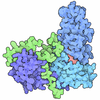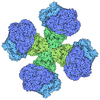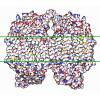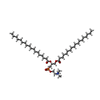+ Open data
Open data
- Basic information
Basic information
| Entry | Database: PDB / ID: 6s59 | ||||||
|---|---|---|---|---|---|---|---|
| Title | Structure of ovine transhydrogenase in the apo state | ||||||
 Components Components | Nicotinamide nucleotide transhydrogenase | ||||||
 Keywords Keywords |  MEMBRANE PROTEIN / MEMBRANE PROTEIN /  mitochondrial / proton-translocating / mitochondrial / proton-translocating /  nicotinamide nucleotide transhydrogenase nicotinamide nucleotide transhydrogenase | ||||||
| Function / homology |  Function and homology information Function and homology information: /  proton-translocating NAD(P)+ transhydrogenase / proton transmembrane transport / proton-translocating NAD(P)+ transhydrogenase / proton transmembrane transport /  mitochondrial inner membrane / identical protein binding mitochondrial inner membrane / identical protein bindingSimilarity search - Function | ||||||
| Biological species |   Ovis aries (sheep) Ovis aries (sheep) | ||||||
| Method |  ELECTRON MICROSCOPY / ELECTRON MICROSCOPY /  single particle reconstruction / single particle reconstruction /  cryo EM / Resolution: 3.7 Å cryo EM / Resolution: 3.7 Å | ||||||
 Authors Authors | Kampjut, D. / Sazanov, L.A. | ||||||
| Funding support |  Austria, 1items Austria, 1items
| ||||||
 Citation Citation |  Journal: Nature / Year: 2019 Journal: Nature / Year: 2019Title: Structure and mechanism of mitochondrial proton-translocating transhydrogenase. Authors: Domen Kampjut / Leonid A Sazanov /  Abstract: Proton-translocating transhydrogenase (also known as nicotinamide nucleotide transhydrogenase (NNT)) is found in the plasma membranes of bacteria and the inner mitochondrial membranes of eukaryotes. ...Proton-translocating transhydrogenase (also known as nicotinamide nucleotide transhydrogenase (NNT)) is found in the plasma membranes of bacteria and the inner mitochondrial membranes of eukaryotes. NNT catalyses the transfer of a hydride between NADH and NADP, coupled to the translocation of one proton across the membrane. Its main physiological function is the generation of NADPH, which is a substrate in anabolic reactions and a regulator of oxidative status; however, NNT may also fine-tune the Krebs cycle. NNT deficiency causes familial glucocorticoid deficiency in humans and metabolic abnormalities in mice, similar to those observed in type II diabetes. The catalytic mechanism of NNT has been proposed to involve a rotation of around 180° of the entire NADP(H)-binding domain that alternately participates in hydride transfer and proton-channel gating. However, owing to the lack of high-resolution structures of intact NNT, the details of this process remain unclear. Here we present the cryo-electron microscopy structure of intact mammalian NNT in different conformational states. We show how the NADP(H)-binding domain opens the proton channel to the opposite sides of the membrane, and we provide structures of these two states. We also describe the catalytically important interfaces and linkers between the membrane and the soluble domains and their roles in nucleotide exchange. These structures enable us to propose a revised mechanism for a coupling process in NNT that is consistent with a large body of previous biochemical work. Our results are relevant to the development of currently unavailable NNT inhibitors, which may have therapeutic potential in ischaemia reperfusion injury, metabolic syndrome and some cancers. | ||||||
| History |
|
- Structure visualization
Structure visualization
| Movie |
 Movie viewer Movie viewer |
|---|---|
| Structure viewer | Molecule:  Molmil Molmil Jmol/JSmol Jmol/JSmol |
- Downloads & links
Downloads & links
- Download
Download
| PDBx/mmCIF format |  6s59.cif.gz 6s59.cif.gz | 368.2 KB | Display |  PDBx/mmCIF format PDBx/mmCIF format |
|---|---|---|---|---|
| PDB format |  pdb6s59.ent.gz pdb6s59.ent.gz | 278.9 KB | Display |  PDB format PDB format |
| PDBx/mmJSON format |  6s59.json.gz 6s59.json.gz | Tree view |  PDBx/mmJSON format PDBx/mmJSON format | |
| Others |  Other downloads Other downloads |
-Validation report
| Arichive directory |  https://data.pdbj.org/pub/pdb/validation_reports/s5/6s59 https://data.pdbj.org/pub/pdb/validation_reports/s5/6s59 ftp://data.pdbj.org/pub/pdb/validation_reports/s5/6s59 ftp://data.pdbj.org/pub/pdb/validation_reports/s5/6s59 | HTTPS FTP |
|---|
-Related structure data
| Related structure data |  10099MC  4635C  4637C  6qtiC  6queC C: citing same article ( M: map data used to model this data |
|---|---|
| Similar structure data |
- Links
Links
- Assembly
Assembly
| Deposited unit | 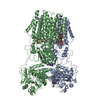
|
|---|---|
| 1 |
|
- Components
Components
| #1: Protein |  Mass: 114010.305 Da / Num. of mol.: 2 / Source method: isolated from a natural source / Source: (natural)   Ovis aries (sheep) / Organ: heart Ovis aries (sheep) / Organ: heart / References: UniProt: W5PFI3 / References: UniProt: W5PFI3#2: Chemical | ChemComp-PC1 /  Phosphatidylcholine PhosphatidylcholineHas ligand of interest | N | |
|---|
-Experimental details
-Experiment
| Experiment | Method:  ELECTRON MICROSCOPY ELECTRON MICROSCOPY |
|---|---|
| EM experiment | Aggregation state: PARTICLE / 3D reconstruction method:  single particle reconstruction single particle reconstruction |
- Sample preparation
Sample preparation
| Component | Name: Nicotinamide nucleotide transhydrogenase in the apo state Type: COMPLEX / Entity ID: #1 / Source: NATURAL | ||||||||||||||||||||
|---|---|---|---|---|---|---|---|---|---|---|---|---|---|---|---|---|---|---|---|---|---|
| Molecular weight | Value: 0.22 MDa / Experimental value: NO | ||||||||||||||||||||
| Source (natural) | Organism:   Ovis aries (sheep) Ovis aries (sheep) | ||||||||||||||||||||
| Buffer solution | pH: 7.4 | ||||||||||||||||||||
| Buffer component |
| ||||||||||||||||||||
| Specimen | Conc.: 5 mg/ml / Embedding applied: NO / Shadowing applied: NO / Staining applied : NO / Vitrification applied : NO / Vitrification applied : YES : YESDetails: Sample was purified in LMNG (final conc. 0.06%) and contained 0.05% CHAPS as a secondary detergent. | ||||||||||||||||||||
| Specimen support | Grid material: COPPER / Grid mesh size: 300 divisions/in. / Grid type: Quantifoil R0.6/1 | ||||||||||||||||||||
Vitrification | Instrument: FEI VITROBOT MARK IV / Cryogen name: ETHANE / Humidity: 100 % / Chamber temperature: 277 K / Details: 4-6 s blotting time |
- Electron microscopy imaging
Electron microscopy imaging
| Experimental equipment |  Model: Titan Krios / Image courtesy: FEI Company |
|---|---|
| Microscopy | Model: FEI TITAN KRIOS |
| Electron gun | Electron source : :  FIELD EMISSION GUN / Accelerating voltage: 300 kV / Illumination mode: FLOOD BEAM FIELD EMISSION GUN / Accelerating voltage: 300 kV / Illumination mode: FLOOD BEAM |
| Electron lens | Mode: BRIGHT FIELD Bright-field microscopy Bright-field microscopy |
| Specimen holder | Cryogen: NITROGEN / Specimen holder model: FEI TITAN KRIOS AUTOGRID HOLDER |
| Image recording | Average exposure time: 3.25 sec. / Electron dose: 90 e/Å2 / Detector mode: SUPER-RESOLUTION / Film or detector model: GATAN K3 (6k x 4k) / Num. of grids imaged: 1 / Num. of real images: 760 |
| Image scans | Movie frames/image: 40 |
- Processing
Processing
| Software | Name: PHENIX / Version: 1.12_2829: / Classification: refinement | ||||||||||||||||||||||||||||||||
|---|---|---|---|---|---|---|---|---|---|---|---|---|---|---|---|---|---|---|---|---|---|---|---|---|---|---|---|---|---|---|---|---|---|
| EM software |
| ||||||||||||||||||||||||||||||||
CTF correction | Type: PHASE FLIPPING AND AMPLITUDE CORRECTION | ||||||||||||||||||||||||||||||||
| Particle selection | Num. of particles selected: 500001 | ||||||||||||||||||||||||||||||||
| Symmetry | Point symmetry : C1 (asymmetric) : C1 (asymmetric) | ||||||||||||||||||||||||||||||||
3D reconstruction | Resolution: 3.7 Å / Resolution method: FSC 0.143 CUT-OFF / Num. of particles: 67908 / Num. of class averages: 1 / Symmetry type: POINT | ||||||||||||||||||||||||||||||||
| Atomic model building | B value: 137 / Protocol: AB INITIO MODEL / Space: REAL / Target criteria: Correlation coefficient, EMRinger score | ||||||||||||||||||||||||||||||||
| Atomic model building | PDB-ID: 6QTI Accession code: 6QTI / Source name: PDB / Type: experimental model |
 Movie
Movie Controller
Controller



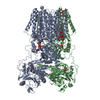
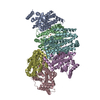
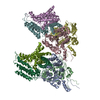


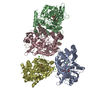
 PDBj
PDBj